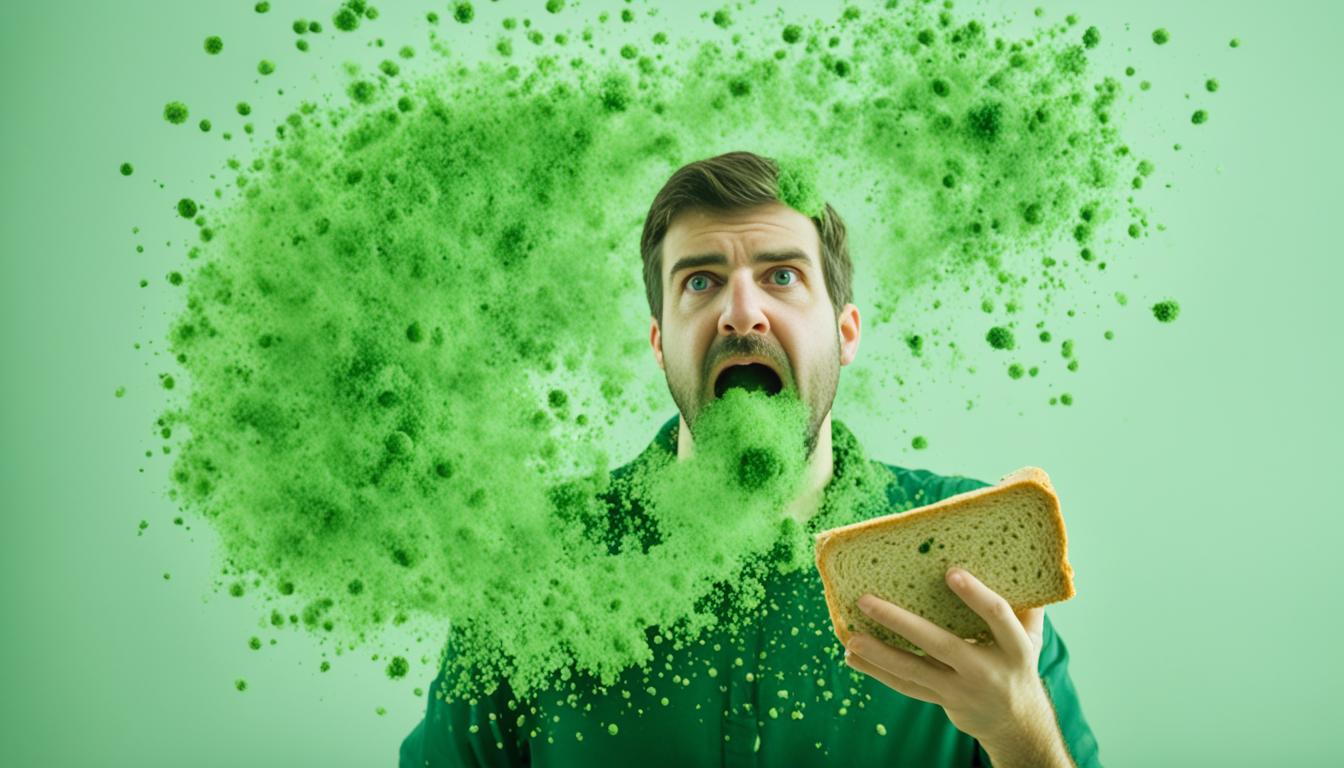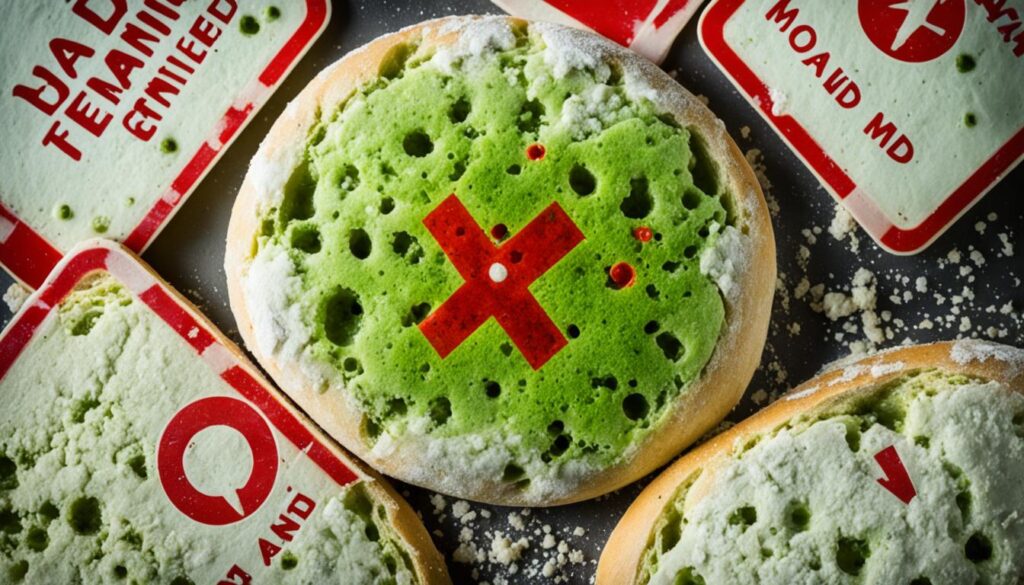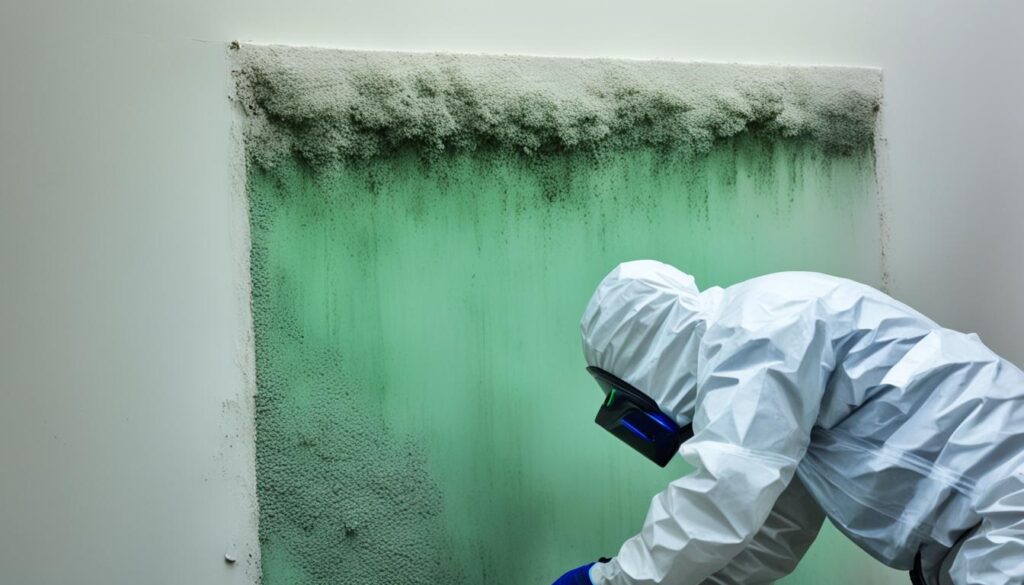
Eating Mold: Risks and Safety Measures Explained
Welcome to our informative guide on eating mold, where we will address the risks associated with consuming mold-contaminated food and provide essential safety measures to protect your health. Mold is a common household issue that can also affect our food, posing potential health hazards if not properly addressed.
Understanding the risks of eating mold is crucial to make informed decisions and safeguard your well-being. Mold contamination can lead to the presence of mycotoxins, which are toxic substances produced by certain types of mold. These mycotoxins can have detrimental effects on our health when ingested.
Therefore, it is important to follow safety measures and precautions to minimize the chances of ingesting mold and to prevent mold exposure in general. By implementing these measures, you can ensure that the food you consume is safe and free from harmful contaminants.
Key Takeaways:
- Consuming mold-contaminated food can pose health risks due to the presence of mycotoxins.
- Proper food storage and regular mold inspections are essential safety measures.
- Preventing mold growth in homes and food establishments is crucial for food safety.
- Seek professional assistance, like Fix Mold Miami at 305-465-6653, for mold assessments and remediation.
- Stay informed and take necessary precautions to protect yourself from potential health hazards.
Understanding the Risks of Eating Mold
In this section, we will delve into the health implications of consuming mold-contaminated food and the potential dangers it poses to our well-being. Mold contamination in food can occur due to improper storage, moisture, or long shelf life, leading to the growth of fungi and the production of mycotoxins – toxic substances produced by some types of molds.
Exposure to mold and mycotoxins can have various health effects, depending on the individual’s sensitivity and the type and amount of mold ingested. Common health implications of eating mold-contaminated food include:
- Allergic reactions: Mold exposure can trigger allergic reactions in individuals sensitive to mold spores. Symptoms may include sneezing, coughing, wheezing, skin rashes, and eye irritation.
- Respiratory issues: Inhaled mold spores or mycotoxins can irritate the respiratory system, leading to coughing, throat irritation, nasal congestion, and respiratory infections.
- Gastrointestinal problems: Consuming food containing mold can cause stomachaches, nausea, vomiting, diarrhea, and digestive discomfort.
- Immunosuppression: Prolonged exposure to mycotoxins may weaken the immune system, increasing the risk of infections and other illnesses.
It’s important to note that some individuals, such as those with weakened immune systems, asthma, or allergies, may be more susceptible to the health risks of mold consumption. Additionally, the severity of the health implications may vary depending on the concentration of mold and mycotoxins in the food.
The Presence of Mycotoxins
Mycotoxins are toxic compounds produced by certain molds. They can contaminate food and pose significant health risks when ingested. The types of mycotoxins commonly found in mold-contaminated food include:
- Aflatoxins: Produced by Aspergillus species, aflatoxins are known carcinogens and can cause liver damage.
- Ochratoxin A: Produced by Aspergillus ochraceus and Penicillium verrucosum, ochratoxin A can affect the kidneys and may have carcinogenic properties.
- Zearalenone: Produced by Fusarium species, zearalenone is associated with estrogenic effects and can impact reproductive health.
- Trichothecenes: Produced by various molds, trichothecenes can have toxic effects on the nervous system, immune system, and overall health.
Exposure to mycotoxins through the consumption of mold-contaminated food can lead to both short-term and long-term health complications. Therefore, it is crucial to be aware of the potential presence of mycotoxins in mold-contaminated food and take necessary precautions to prevent their consumption.
“Understanding the risks of eating mold is vital for making informed decisions about food consumption and maintaining good health.”
To visually illustrate the health implications of consuming mold-contaminated food, refer to the table below that highlights common symptoms and associated health risks:
| Symptoms | Health Risks |
|---|---|
| Allergic reactions | – Asthma exacerbation – Allergic rhinitis – Skin rashes |
| Respiratory issues | – Coughing and wheezing – Shortness of breath – Respiratory infections |
| Gastrointestinal problems | – Stomachaches – Nausea and vomiting – Diarrhea |
| Immunosuppression | – Increased susceptibility to infections – Weakened immune response |
By understanding the health risks associated with eating mold-contaminated food, individuals can make informed choices to protect their well-being. It is essential to follow proper food storage guidelines, regularly inspect food for mold contamination, and discard any moldy or expired items. Additionally, maintaining a clean and dry environment in the kitchen and other food storage areas can help prevent mold growth and reduce the risk of exposure to mycotoxins.

Safety Measures and Precautions for Mold Exposure
To prevent mold exposure and ensure food safety, it is essential to adopt appropriate safety measures and precautions. By following these guidelines, individuals can minimize the risk of inadvertently ingesting mold-contaminated food and create a healthier living environment.
Food Safety Tips
Implementing proper food safety practices is crucial in preventing mold growth and contamination. Here are some essential tips to keep in mind:
- Regularly inspect and clean your refrigerator to prevent mold growth on food items.
- Properly store food in airtight containers or wraps to minimize moisture and air exposure.
- Check expiration dates and discard any expired or spoiled food.
- Wash fruits and vegetables thoroughly before consuming to remove any potential mold spores.
- Avoid leaving perishable food items at room temperature for extended periods. Refrigerate leftovers promptly.
Preventing Mold Exposure
Aside from food safety practices, taking precautions to prevent mold growth in your home and surroundings is crucial. Here are some measures you can implement:
- Keep humidity levels in your home below 50% by using dehumidifiers or adequate ventilation.
- Fix any water leaks or plumbing issues promptly to prevent moisture buildup.
- Ensure proper ventilation in areas prone to moisture, such as bathrooms and kitchens.
- Clean and dry wet or damp areas within 48 hours to prevent mold growth.
- Regularly inspect and clean air ducts, filters, and HVAC systems to maintain proper airflow and prevent mold colonization.
Mold Remediation
In cases where mold growth is extensive or difficult to manage, professional mold remediation may be necessary. Mold remediation experts can effectively identify and eliminate mold, implementing appropriate measures to prevent future growth. Seeking professional assistance is crucial when dealing with severe or persistent mold issues.

By following these food safety tips, taking precautions to prevent mold exposure, and seeking professional help for mold remediation when needed, individuals can protect their health and create a safe living environment.
Conclusion
In conclusion, it is crucial to be aware of the health risks associated with consuming mold-contaminated food. By understanding the potential dangers and taking appropriate safety measures, individuals can protect themselves from these hazards. Proper food storage and regular mold inspections are essential in preventing mold growth and minimizing the chances of inadvertently ingesting mold.
To ensure a healthy living environment, it is important to prioritize food safety and seek professional assistance if needed. Companies like Fix Mold Miami, available at 305-465-6653, can provide thorough mold assessments to help identify and address any mold-related issues in your home or business. By staying informed and taking necessary precautions, you can safeguard your well-being and maintain a mold-free environment.
Remember, prevention is key when it comes to mold exposure. Stay vigilant, follow food safety guidelines, and be proactive in addressing any mold-related concerns. By doing so, you can enjoy peace of mind knowing that you are taking the necessary steps to protect yourself and those around you from the potential health risks posed by mold-contaminated food.




